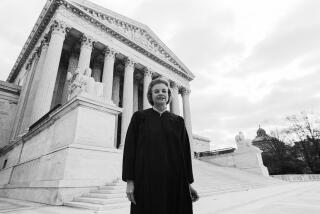Harriet Miers to step down as White House counsel
WASHINGTON — Harriet E. Miers, a member of a diminishing circle of allies who came to Washington in 2001 with President Bush, is resigning as White House counsel at the end of this month, the White House announced Thursday.
The ill-fated nomination of Miers to the Supreme Court, in 2005, left Bush tangled in complaints of cronyism and in dispute with his conservative allies.
Her departure comes as the administration copes with a number of challenges: demonstrating its relevance during its final two years, when new Democratic majorities are in the House and Senate; renewing the energy of senior aides whose tenure is ticking away; and Democrats’ plans to begin congressional investigations into such topics as the Iraq war, the response to Hurricane Katrina, and a controversial domestic surveillance program in terrorism cases.
“She’s been here for six years. It’s hard duty,” said White House Press Secretary Tony Snow, when asked why Miers was leaving.
Miers was among the Texans who came east with Bush at the start of his first term -- along with Alberto R. Gonzales, now attorney general, as White House counsel; Margaret Spellings, now Education secretary, as domestic policy advisor; and Karen Hughes, who worked 18 months as a counselor to the president and is now undersecretary of State for public diplomacy. Another member of that group -- Scott McClellan, who became White House press secretary -- has left the administration.
Although she had worked as a legal advisor to Bush for more than a decade, Miers, 61, was little known outside Washington and Texas until Oct. 3, 2005, when the president -- calling her “exceptionally well suited to sit on the highest court of our nation” -- nominated her to succeed Justice Sandra Day O’Connor.
But on Oct. 27, the president withdrew the nomination, which had propelled the White House into a storm of criticism -- both from conservatives who questioned Miers’ anti-abortion credentials and from a broader spectrum of critics who challenged the qualifications of someone who had never served on the bench.
As soon as she resumed her White House work, she helped Bush choose Samuel A. Alito Jr., a federal appeals court judge, for the Supreme Court seat.
Miers’ resignation brought little comment in a city focused on the first day of the 110th Congress. But Sen. Kay Bailey Hutchison, a fellow lawyer, Republican and Texan, commended her, in a written statement, “for serving our nation with honor and distinction,” and called her “a pioneer among women.”
Miers’ ties to Bush date to 1993 and the start of his successful 1994 campaign to become governor of Texas. He hired Miers, then a partner at a large Texas law firm, as the campaign’s lawyer.
She has handled important jobs for him ever since: as his appointed chairwoman of the Texas Lottery Commission; as his first White House staff secretary, a key behind-the-scenes job; as deputy chief of staff; and, since the start of his second term, as his White House lawyer. Her final job placed her in a central position in the search for nominees for the federal bench, from District Court seats to the Supreme Court, and as a key advisor on legal matters and legislation.
In a lengthy resignation letter, Miers said it was “hard to leave the tasks at hand.” She gave no reason for her departure.
Reflecting the regard with which she was held among White House staff members, Snow called her “an extraordinarily wonderful human being, but also somebody who is a very careful and scrupulous lawyer, a ferocious defender of the Constitution, and somebody who was also deeply loyal to the president, and just somebody who is a delight to work with.”
Her departure, he said, was “bittersweet,” but “she has decided that it’s time to move on.”
james.gerstenzang@
latimes.com
More to Read
Sign up for Essential California
The most important California stories and recommendations in your inbox every morning.
You may occasionally receive promotional content from the Los Angeles Times.










